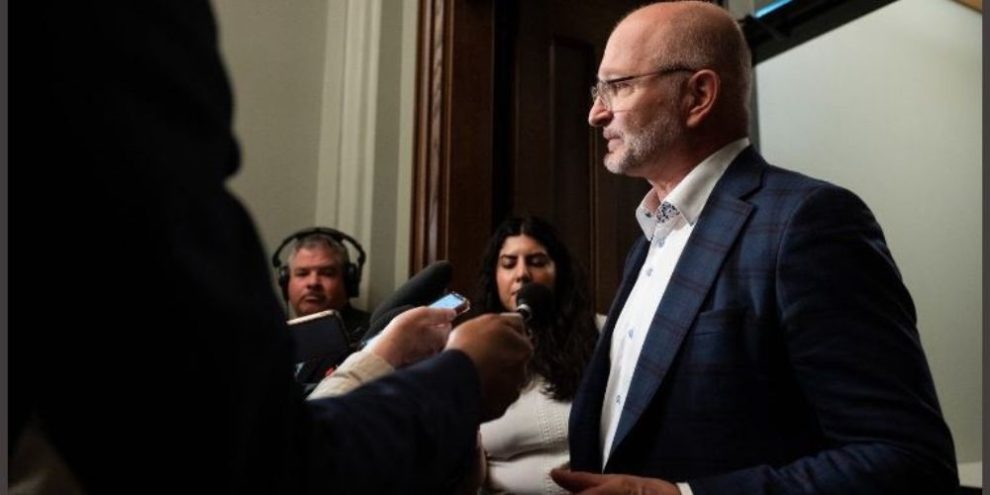
By David Fraser in Ottawa
The Liberals' new bail-reform legislation includes new measures that would make it more difficult for some repeat violent offenders to get released on bail.
Justice Minister David Lametti introduced the bill Tuesday morning amid an ongoing plea from premiers, police associations and victims' rights groups to strengthen the law.
He said the bill responds "directly" to their concerns.
The legislation introduces reverse-onus bail conditions for people charged with serious violent offences involving a weapon, in cases where the person was convicted of a similar violent offence within the past five years.
It will also add some firearms offences to existing reverse-onus provisions, and expand the provision of that measure in cases where the alleged crimes involve intimate partner violence.
While the burden of proof usually rests on prosecutors to convince judges why offenders should stay behind bars, this means that in some cases, the offender will now be the one who has to prove in court why they should be released on bail.
"You are innocent until proven guilty, and this is a critically important part of our legal system," Lametti said during a news conference on Tuesday.
"But what we're doing for certain violent offences is changing the default position and making sure that it is only in cases where there isn't a threat to security."
Lametti said he hopes the law will pass with unanimous consent from other political parties.
"This bill responds directly to concerns raised by the premiers, as well as police chiefs and victims' advocates," he said.
Public Safety Minister Marco Mendicino said the announcement is about "keeping communities safe" and "zeroes in on offenders who use guns and other weapons."
Conservative Leader Pierre Poilievre said during his own press conference that he would go a step further if he was prime minister and waive such offenders' rights to a bail hearing in the first place.
Poilievre said he would bring in laws that would require repeat violent offenders who are newly arrested for violent crimes to remain behind bars throughout their trial — "jail, not bail."
He went on to say that the proposed laws would not raise the bar to access bail and instead they create a series of lower bars and will continue to allow repeat violent offenders to be released on bail.
"A common sense Conservative government will reverse Trudeau's catch and release," he said.
NDP Leader Jagmeet Singh said bail reforms cannot be the only thing considered to keep communities safe, and called for better supervision of people who are released on bail.
"We also know that there are serious concerns around mental health and addictions that are also creating serious problems around safety, and that has to be addressed as well," he said.
The proposed changes to the Criminal Code come amid pressure from the provinces and territories to reduce the number of repeat violent offenders who are granted bail. Premiers had unanimously asked the government to expand the reverse-onus provisions.
In a statement, Ontario's Solicitor General Michael Kerzner and Attorney General Doug Downey said too many innocent people have lost their lives due to dangerous criminals not being behind bars.
"If passed, the federal government's proposed legislation will bring meaningful and much-needed changes to Canada’s bail system," the statement said.
B.C. Attorney General Niki Sharma said in a statement the changes were welcomed.
"We've been clear all along that federal action is needed to fix the core of this national issue. Given the challenges we've seen, I am glad the federal government has taken B.C.'s concerns seriously," her statement said.
"While we'll be looking closely at the details of the federal legislation, the amendments broadly cover the types of violence we are seeing in our communities."
High-profile cases have recently brought attention to the issue, including the stabbing deaths of a woman and her daughter in Edmonton earlier this month.
The accused killer, whom police did not name but who has been identified in media reports, had reportedly been released on bail for a different crime less than three weeks earlier. The charge in that separate case was reportedly stayed a few days before the stabbings, and the man died in hospital last week.
Calls for change had intensified in response to the late December death of Ontario Provincial Police officer Const. Greg Pierzchala.
Court documents showed one of the two people facing a first-degree murder charge in his death, Randall McKenzie, was initially denied bail in a separate case involving assault and weapons charges but was released after a review.
The documents show a warrant was issued for McKenzie's arrest after he didn't show up for a court date in August.
After meeting with provincial and territorial justice ministers in March, Lametti called Pierzchala's death a "catalyst for change."
Lametti promised at the meeting that he would bring in targeted reforms, but that they would respect the fundamental rights of accused people.
The Charter of Rights and Freedoms guarantees that anyone who is charged with a crime will not be denied reasonable bail without just cause.
Manitoba Justice Minister Kelvin Goertzen said Tuesday that he had not gone through the details of the bill yet, but at first blush, it appeared to be "hitting on a lot of the themes that ministers were concerned about" when they met with Lametti.
Banner image: David Lametti, Minister of Justice and Attorney General of Canada, speaks to reporters after a caucus meeting on Parliament Hill in Ottawa, on Wednesday, May 10, 2023. THE CANADIAN PRESS/Spencer Colby
This report by The Canadian Press was first published May 16, 2023





